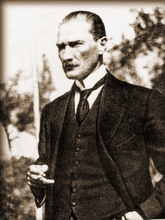This good question reminds me of efforts to translate any classic literature into a language other than the one in which it was originally written. For example, check out this heartfelt/içten review of Edmond Rostand's great play Cyrano de Bergerac. In it, the review's author, Jonathan Yardley, touches on how hard it is to translate a literary work of art. He gives proper credit to Brian Hooker for bringing to the English-speaking world the magic of Cyrano.

Years ago, I was given the same tip about Cyrano—"Make sure the Cyrano play is based on the Hooker translation!" Apparently, lesser translations deprive you of the full spirit of the Frenchman's achievement.
That said, I approach the idea of translating even this tiny fragment of the great William Shakespeare with reverent caution.
First, though Turkish has no separate verb "to be," it does have the means to express the concept, as Barry showed in his comment on my Decartes post. It's just not a literal translation.
Therein lies a key lesson I'm teaching myself—try to capture the spirit of what's being said, not a verbatim, word-for-word translation. As in everything I do, reality is my guide. It comes first, language second. The latter is a tool to help me hold on firmly to the former. And, as I continue to discover, learning an additional tool like Turkish, is helping me even more to stay happily anchored to reality.
So, taking all this into account, what would be an appropriate translation of Hamlet's famous phrase?
First, I'll make a philosophical observation. To be is to be something. Attributes are attributes of some entity in reality. They don't exist apart from what gives rise to them in the first place.
Am, are, is are all different parts of the English verb to be. What is Hamlet really talking about? Translating that, first, into prosaic English, he's saying "To be...a living man or to be...worm food" or "To live or not to live."
That said, my prosaic translation is as follows: "Yaşamak, yaşamak değil." Yaşamak means to live. Değil means not.
Now, I'm being literal here, of course. Knowing that, I stand especially ready and willing to be corrected.
Another reason why I'm tentative about this prosaic translation is this—my textbook describes the use of değil in the context of transforming a noun or an adjective into a negative. I haven't seen it applied to an infinitive yet.
Scholars, weigh in, lütfen!


3 comments:
Actually your translation means "To live is not to live."
Thing is, while there's no verb used for "to be" in the present tense (I am, you are, he is), there is in fact an infinitive "to be," and that's olmak. Now to negate it you put -ma- between the verb stem (ol-) and its ending, thus "not to be" = olmamak.
So we translate Hamlet as saying "Olmak ya da olmamak."
Hope this isn't too confusing!
Far from confusing, it is helpful. Thank you!
I feel some of my questions may be a form of getting ahead of myself. Still, I'll hang onto this bit of helpful information pending a chance to circle back to it. Remember the "spiral theory of knowledge"?
For my other visitors, "spiral theory of knowledge" refers to the fact that knowledge is a unity or sum of understanding you build up across time. Whatever you learn today about something does not preclude you from learning something more about it later. What you first learned is not necessarily nullified by your later knowledge but can enhance what you learned earlier. In the current case, I'm learning about the verb "to be" and how it is handled in Turkish. Is my grasp of it complete so far? No. Do I have to learn it fully now? No. I can come back to this point as needed as I learn more about the other aspects of Turkish.
Personally, I find this perspective a great motivator--that is, I don't worry about some aspect that is not 100% in my back pocket right away. I just keep plugging away enjoying the process itself as well as looking forward to the ultimate payoff when I can converse in a different language.
Thanks again, Barry!
Absolute fan of all his plays. And not just me. Look what famous peers said about Shakespeare:
http://www.tributespaid.com/quotes-on/william-shakespeare
Post a Comment